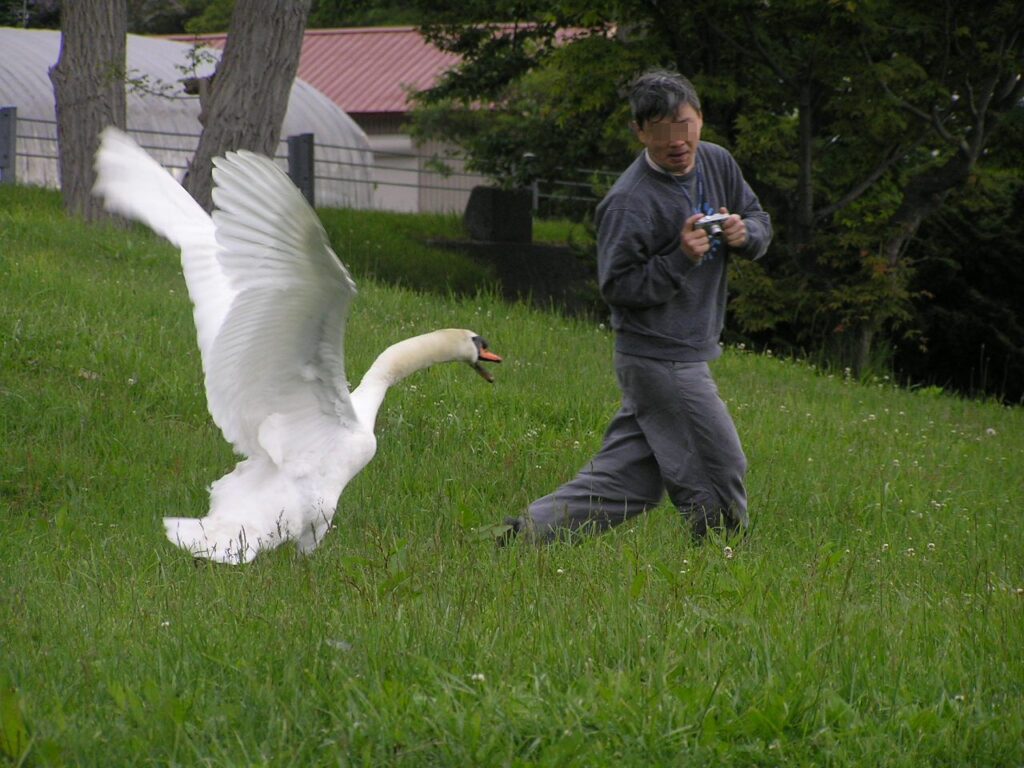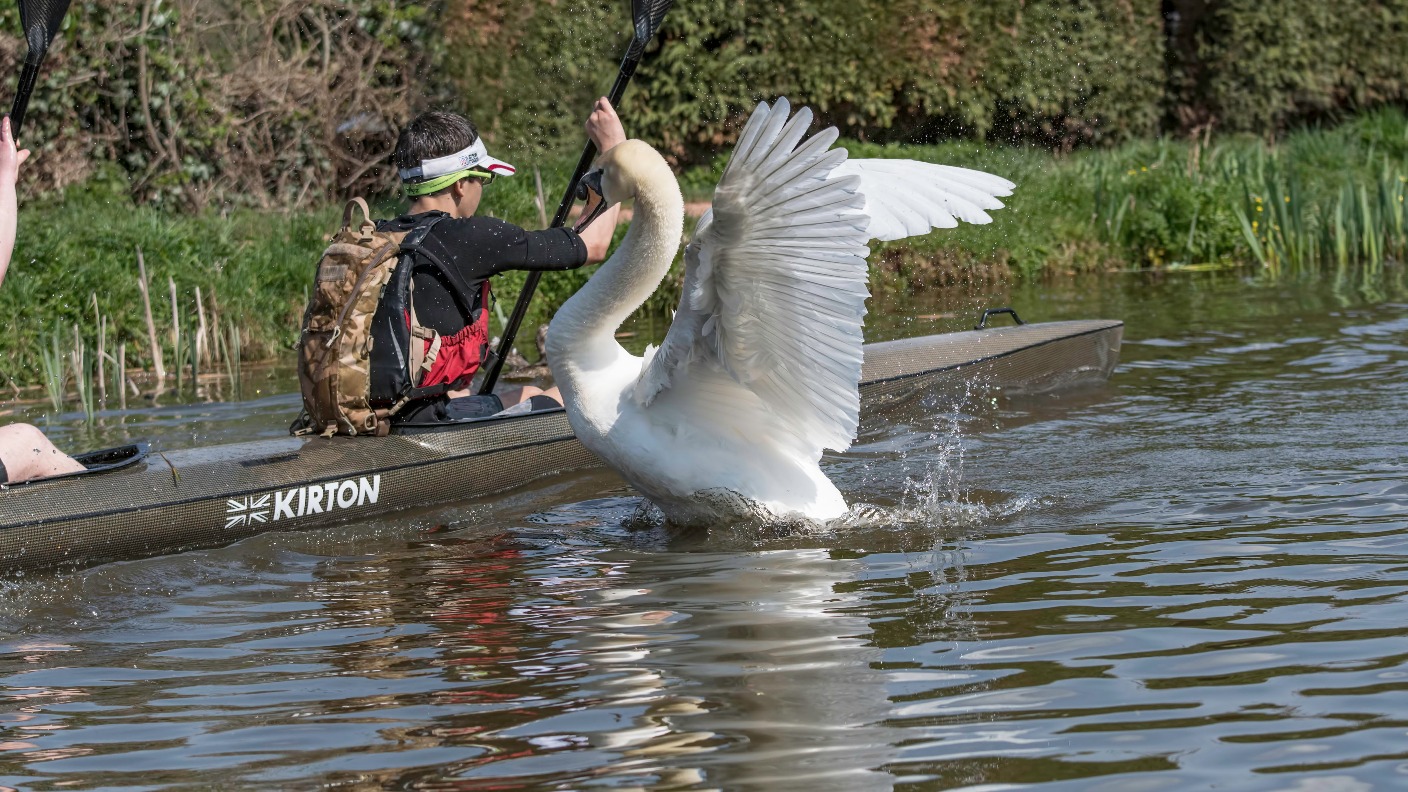Suppose a swan attacks you; slowly and calmly back away without making sudden movements or aggressive gestures. Create distance and avoid eye contact. Protect yourself with an object if needed.
Swans, known for their elegance and beauty, can sometimes exhibit aggressive behavior, threatening humans.
While swan attacks are relatively rare, it is essential to be prepared and know how to handle such situations for personal safety.
These graceful creatures can become aggressive when they feel threatened or provoked, especially during their nesting season, when they are fiercely protective of their nests and eggs.
Understanding how to diffuse a confrontational encounter with a swan is crucial to ensure the safety of both humans and the swans themselves.
Why May the Swans Attack You?

Swans, typically known for their elegance and beauty, can become aggressive and attack humans under certain circumstances.
Here are the most probable reasons why the Swans can attack you.
Nesting Protection
Nesting protection is a significant factor that can lead swans to attack when they perceive a potential threat.
During nesting season, which typically occurs in spring and early summer, swans become highly territorial and protective of their nesting sites, eggs, and, later, their young cygnets.
This behavior is a vital survival strategy to ensure their offspring’s safety and successful rearing. Any perceived intrusion by humans or animals triggers a swan’s natural defense mechanism.
Their large size, powerful wings, and sharp beaks are used to ward off potential threats and protect their nesting area.
Understanding this nesting protection instinct is crucial when encountering swans, allowing individuals to avoid confrontations and respect their critical role in the ecosystem.
Perceived Threat
Swans may attack when they perceive a threat due to their inherent survival instincts and protective nature:
- Survival Instincts: Swans have evolved to recognize and respond to potential environmental threats. This heightened vigilance is driven by their need to ensure their safety and that of their offspring.
Any unfamiliar or sudden movement, sound, or presence near their territory triggers an instinctual response to defend themselves.
- Protection of Offspring: During nesting and breeding seasons, swans become particularly sensitive to perceived threats around their nests and young cygnets.
Their instinct to protect their vulnerable offspring primarily motivates their defensive behavior.
They view any perceived intruder as a potential threat to the safety of their nestlings.
- Resource Defense: Swans establish territories in bodies of water rich in food sources. They defend these territories to secure access to essential resources like aquatic plants and insects.
When they interpret an intrusion as a threat to their access to food, they may respond aggressively to safeguard their resources.
- Social Hierarchy: Swans, especially males, may also engage in confrontations to establish dominance within their social groups.
When interacting with other swans or unfamiliar beings, they might exhibit territorial behavior to establish their status in the hierarchy.
Territorial Behavior
Territorial behavior in swans can lead to attacks when they perceive their territory is being invaded or threatened.
Swans establish territories to secure sufficient resources for nesting, feeding, and raising their young.
When an unfamiliar entity, a human or another animal, enters their perceived territory, swans react aggressively to protect their resources and breeding sites.
This instinctive behavior aims to deter potential competitors or predators from encroaching upon their space.
Swans are particularly defensive during nesting season, becoming more prone to attack when they feel their territory is at risk.
Understanding their territorial nature is essential to prevent unwanted confrontations, ensuring both human safety and the well-being of these majestic birds.
Parental Instincts
Both male and female swans actively participate in raising their young. If they feel that their cygnets (young swans) are in danger, they may exhibit aggressive behavior to protect them.
Parental instincts are a driving force behind swans’ potential to attack when they perceive a threat:
- Offspring Protection: Swans exhibit strong parental instincts, especially during nesting and rearing seasons.
When their cygnets are vulnerable and dependent on their care, swans become hyper-vigilant to safeguard their young from potential dangers.
Any perceived intrusion into their territory triggers an aggressive response to ensure the safety of their offspring.
- Nesting Site Security: Swans invest considerable effort in building and maintaining their nests.
They perceive any disturbance or threat to their nesting site as a risk to their reproductive success. This prompts a defensive reaction as they prioritize the security of their nest and eggs.
- Predator Deterrence: Swans use aggression as a strategy to deter potential predators from approaching their nest or young.
Their imposing size, coupled with their willingness to defend, serves as a deterrent against would-be threats. This aggressive response minimizes the likelihood of predation on their vulnerable offspring.
Natural Selection: Over generations, swans that effectively protect their offspring have better chances of passing on their genes to the next generation.
This reinforces the instinct to react aggressively to potential threats as a survival mechanism that has been shaped by natural selection.
Food Expectations: In locations where people commonly feed swans, they can associate humans with food. If they approach expecting to be fed and are disappointed, they might become agitated and act aggressively.
Injury or Illness: Swans that are injured, ill, or in pain might become defensive due to their vulnerability. If they perceive humans as potential threats, they might resort to aggression as a form of self-defense.
Defending Mates
Swans create strong pair bonds that endure for years or even a lifetime. During mating and nesting seasons, their commitment to each other intensifies, and they become more defensive of their partners.
If they interpret any nearby presence as a potential danger to their mate, they may respond aggressively to protect them.
This behavior reflects their commitment to ensuring the survival of their partnership and the successful raising of their offspring.
Understanding this aspect of their behavior is vital when encountering swans to avoid triggering defensive responses while respecting their dedication to their mates.
Past Negative Experiences: Swans have a good memory and can remember negative interactions. If they have had previous negative encounters with humans, they might respond aggressively as a precaution.
What to Do If A Swan Attacks You? – Some Tricks and Tips to Follow to Protect Yourself from Swan Attack

Swans, known for their elegance and grace, are typically peaceful creatures. However, there may be instances where a swan becomes aggressive and attacks.
Understanding the reasons behind a swan attack can help you handle the situation better. Swans can display aggression, Whether protecting their territory, offspring, or feeling threatened.
Here’s what to do if a swan attacks you, providing strategies to ensure your safety and minimize harm.
- The first step is to remain as calm as possible. Sudden movements or panic can escalate the situation.
- Swans might perceive direct eye contact as a threat. Keep your gaze lowered and avoid staring at the swan.
- Begin backing away from the swan while keeping it in your peripheral vision. Slow, deliberate movements help minimize the perception of threat.
- Running can trigger a swan’s chase instinct, making the situation worse. Maintain a steady pace while moving away.
- If the swan becomes more aggressive, shield your head and face with your arms or an object, like a bag or a jacket.
- If you have an umbrella, a bag, or a jacket, hold it out in front of you to create a visual barrier between you and the swan.
- Continue backing away until you are at a safe distance from the swan. Give it space to calm down.
- Swans are particularly protective around their nests and offspring. Be cautious around nesting areas during breeding season.
- If the swan’s behavior is overly aggressive or poses a threat, it’s a good idea to report the incident to local authorities, such as animal control or wildlife agencies.
- If the swan’s attack results in injuries, seek medical attention promptly to prevent infections and ensure proper care.
How to Stay Calm and Assess the Situation when a Swan Attacks You?
When faced with a swan attack, maintaining composure and assessing the situation are crucial steps to ensure your and the swan’s safety.
Swans may turn aggressive when they sense danger, particularly during nesting season.
- To stay calm, take slow, deliberate breaths to regulate your heart rate and avoid sudden movements that might escalate the encounter.
- Next, assess the swan’s behavior. Is it charging aggressively or displaying warning signs like hissing and flapping wings?
- Understanding its intent can guide your response. Avoid direct eye contact, as swans might interpret it as a challenge. Instead, keep the swan in your peripheral vision while gradually backing away.
- As you retreat, remember that running can trigger a chase response. Maintain a steady pace and create a barrier between you and the swan using a bag, jacket, or umbrella.
- Once at a safe distance, report the incident to local authorities if necessary and seek medical attention if injuries occur.
By remaining composed and evaluating the situation, you increase the chances of defusing the confrontation and ensuring everyone’s safety.
A A personal experience: What to do when the Swan Attacks You
One summer afternoon, while kayaking near a serene lake, I encountered a swan that unexpectedly became agitated.
As I paddled closer to capture its beauty, the swan began hissing and flapping its wings menacingly. Remembering advice about swan behavior, I stayed calm, avoided direct eye contact, and slowly paddled away.
The swan followed but lost interest after a while. I resisted the urge to panic or make sudden movements and instead focused on creating distance between us.
The experience taught me the importance of understanding these majestic birds’ territorial nature and the need to respect their space.
It reaffirmed that staying composed and respecting their boundaries is key to averting potential confrontations with swans.
FAQs
What should I do if a swan attacks me?
Move backward gradually and avoid looking directly at the swan, refraining from running or sudden actions.
Why do swans attack humans?
Swans can become protective during nesting season or when they feel threatened. They might see humans as potential threats to their territory.
Can swan attacks cause injuries?
Yes, swan attacks can cause injuries due to their powerful wings and sharp beaks.
How do I protect myself from a swan attack?
Carry an object like an umbrella or stick to create a barrier between you and the swan. Shield your head and face if attacked.
Should I feed swans to prevent attacks?
No, feeding swans can contribute to aggressive behavior. It’s best to let them find natural food sources.
Are all swans aggressive?
No, not all swans are aggressive, but some can display aggression, particularly during nesting season or when feeling threatened.
What’s the best way to avoid swan attacks?
Keep a safe distance from swans, especially if you’re near their nesting areas. Respect their space and avoid approaching too closely.
Do swans attack boats or kayaks?
Yes, swans can attack boats or kayaks if they perceive them as threats to their territory or nesting sites.
Should I call for help if attacked by a swan?
Yes, you should call for help if attacked by a swan, especially if the attack causes injuries or you’re unable to safely move away.
Can I deter swan attacks with noise or water sprays?
Yes, you can deter the swan attacks with noise and water sprays. But it’s essential to approach the situation cautiously and prioritize safety.
Conclusion
It is crucial to emphasize the importance of knowledge and preparedness when faced with a swan attack. By understanding their behavior and knowing the appropriate actions to take, such situations can be handled more effectively.
Always prioritize personal safety above all else and remain calm to minimize the risk of harm. With proper understanding and precautions, encounters with aggressive wildlife, including swans, can be navigated safely. Stay informed, stay prepared, and stay safe.











